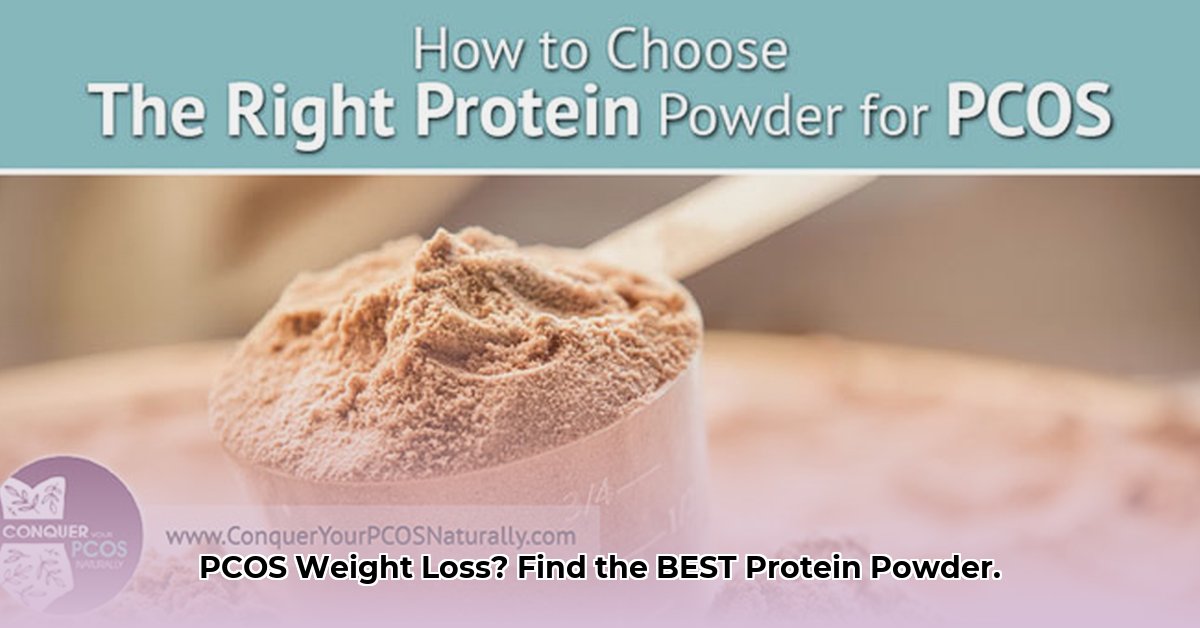
Understanding PCOS and the Role of Protein
Polycystic ovary syndrome (PCOS) impacts millions of women, often making weight management challenging. Irregular periods, excessive androgen levels, and insulin resistance are hallmarks of the condition, frequently leading to weight gain. However, incorporating sufficient protein can significantly aid in PCOS management. Protein is essential for building and repairing tissues, promoting satiety (feeling full), and regulating blood sugar – all critical factors in PCOS weight management. By optimizing protein intake, individuals can improve insulin sensitivity and reduce those frustrating cravings.
Exploring Protein Powder Options: A Detailed Review
Choosing the right protein powder can feel overwhelming. Let's examine popular options, weighing their pros and cons for those with PCOS:
Whey Protein
- Pros: High in protein, readily available, quick digestion.
- Cons: Lactose intolerance can cause digestive issues; potential hormonal interactions in some individuals.
- PCOS Considerations: Choose whey isolate for lactose intolerance. Look for organic and grass-fed options to minimize hormone concerns.
Soy Protein
- Pros: Plant-based, complete protein (containing all essential amino acids).
- Cons: Estrogenic effects in some individuals; not suitable for soy allergies.
- PCOS Considerations: Opt for non-GMO, organic soy protein. Monitor for potential estrogenic effects.
Casein Protein
- Pros: Slow-digesting, promotes sustained satiety.
- Cons: May cause digestive discomfort; higher fat content than whey.
- PCOS Considerations: Ideal for nighttime consumption, potentially improving overnight blood sugar control.
Pea Protein
- Pros: Plant-based, hypoallergenic, gentle on digestion.
- Cons: Lower protein content per scoop than whey.
- PCOS Considerations: Excellent for those with dairy or soy allergies/sensitivities.
Brown Rice Protein
- Pros: Plant-based, hypoallergenic, mild flavor.
- Cons: Lower protein content than whey; flavor may not appeal to everyone.
- PCOS Considerations: A suitable alternative to soy for those with allergies.
This table provides an overview. Other options exist, including pumpkin seed, hemp, or even insect-based proteins. The best choice will depend on individual needs and preferences. Isn't it remarkable how diverse the protein powder options have become?
Choosing the Right Protein Powder: A Practical Guide
Selecting a high-quality protein powder for PCOS involves several key steps:
Prioritize Quality and Transparency: Choose reputable brands offering third-party testing to ensure product purity and accurate labeling. Transparency in sourcing and testing results builds trust.
Minimize Added Sugar: Excess sugar disrupts blood sugar control, worsening PCOS symptoms. Opt for unsweetened or low-sugar options. Have you noticed how many brands now highlight "no added sugar?"
Consider Potential Allergens: Check the ingredient list carefully to avoid allergic reactions. Hypoallergenic options are available for those with common allergies (dairy, soy, etc.).
Scrutinize the Ingredient List: Avoid artificial sweeteners, flavors, fillers, and other unnecessary additives. Simpler ingredients often mean higher quality.
Integrating Protein Powder into Your PCOS Diet: A Step-by-Step Approach
How should you use protein powder effectively?
Determine your needs: Consult your healthcare provider or registered dietitian to determine your optimal daily protein intake. This varies based on factors like age, activity level, and overall health. Why is personalized guidance so important? Because individual metabolic responses differ.
Incorporate it creatively: Add protein powder to smoothies, yogurt, or use it in baking recipes. Remember, it's a supplement, not a meal replacement. Wouldn't it be great to create a signature PCOS-friendly protein smoothie?
Maintain a balanced diet: Protein powder complements, but doesn't replace, a balanced diet rich in whole foods (fruits, vegetables, lean proteins, whole grains).
Potential Risks and Mitigation Strategies
While generally safe, protein powder carries some potential risks:
- Allergic reactions: Always check for allergens.
- Digestive issues: Some individuals experience bloating or gas.
- Kidney strain: Excessive intake can burden the kidneys. Always adhere to recommended dosages.
- Medication interactions: Consult your doctor about potential interactions.
By selecting high-quality products, monitoring your intake, and paying attention to your body's signals, you can minimize risks.
Conclusion: Empowering Your PCOS Journey
Protein powder can be a valuable tool in managing PCOS and weight, but it's part of a holistic approach. Remember that a balanced diet, regular exercise, stress management, and adequate sleep are equally important. Always consult your healthcare provider before starting any new supplement regimen to ensure it aligns with your individual health needs. The journey to better health is personal, and we encourage you to find what works best for you.